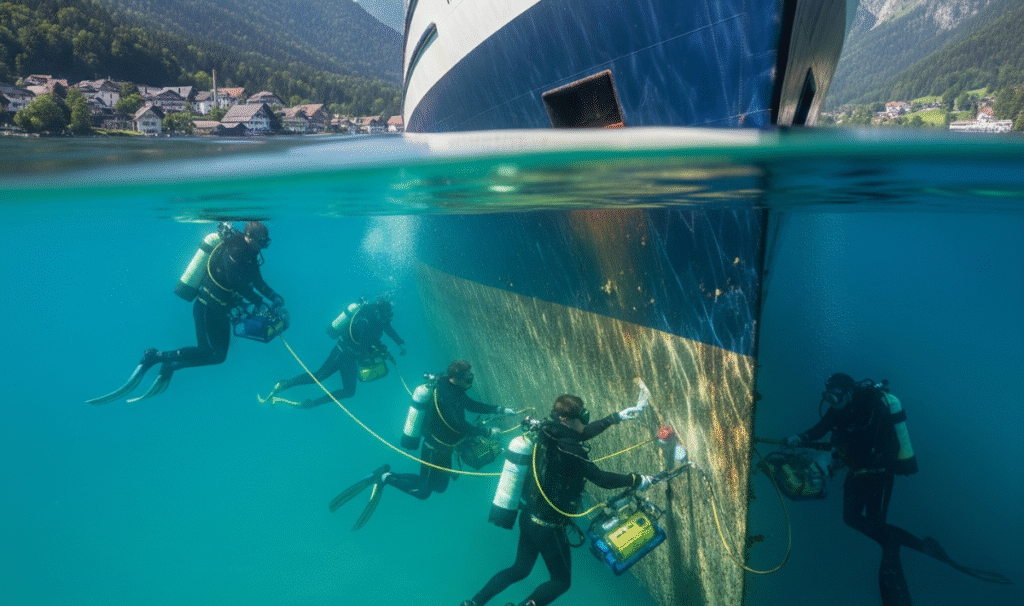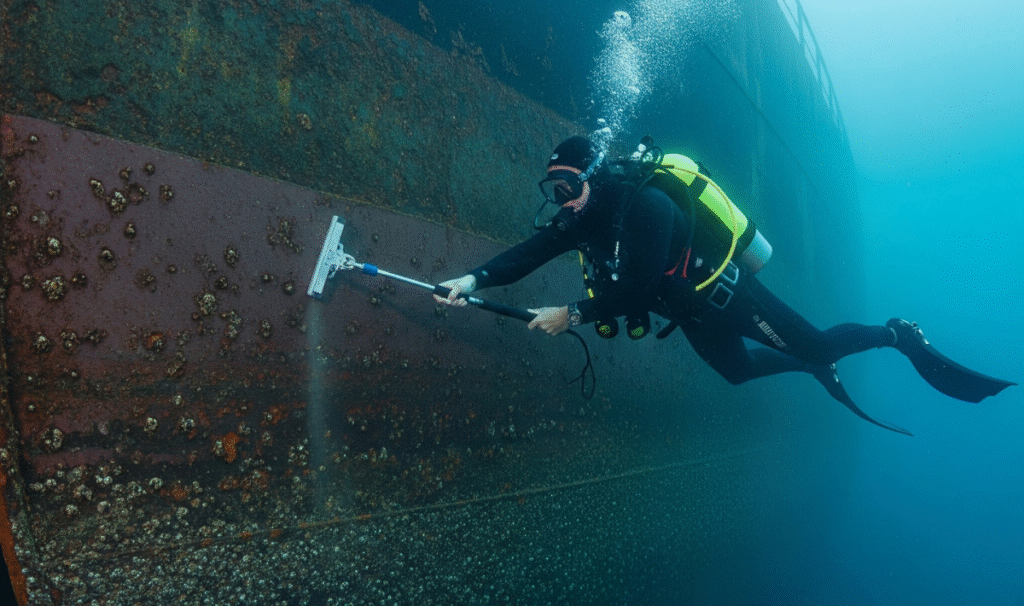Imagine driving your car with a thick coat of mud stuck underneath it. It consumes more fuel, moves sluggishly, and performs poorly. Now, think about that on a massive scale for ships crossing the Black Sea or docking at Ukrainian ports. That’s precisely what happens when a vessel hasn’t had its hull cleaned for months. Biofouling—marine organisms like barnacles, algae, and mussels—sticks stubbornly to the ship’s body, making it drag through the water like it’s pulling anchors.
This is where the importance of underwater ship hull cleaning in Ukraine comes to life. Not only does it boost performance, but it also saves money, preserves the environment, and keeps vessels safer on the open sea. Today, we’ll explore the three biggest benefits of maintaining a clean hull in Ukrainian waters—and why shipping companies shouldn’t overlook it.
Why Ship Hulls Matter More Than You Think
The hull of a ship functions much like the lungs of a human body. You don’t usually see them working, but if they’re compromised, performance collapses. A clean hull means reduced drag, smooth sailing, and long-lasting structural health. A fouled hull? It’s like running a marathon with weights tied to your ankles.
Ships visiting ports in Odesa, Mariupol, or other strategic coastal regions in Ukraine often spend long stretches at sea. During that time, hulls become a playground for marine growth. Without maintenance, efficiency takes a nosedive—and that’s where cleaning takes center stage.

The Growing Relevance of Underwater Ship Hull Cleaning in Ukraine
Ukraine has steadily reinforced its place in international maritime trade. With its Black Sea ports serving as gateways to Europe and Asia, vessels arriving here need to be in peak condition. Authorities, inspired by global standards like those from the IMO and IMCA, have pushed for responsible hull maintenance.
That’s why underwater ship hull cleaning in Ukraine isn’t just a maintenance task anymore—it has become an operational necessity.
Benefit 1: Enhanced Fuel Efficiency & Cost Savings
How Biofouling Increases Fuel Consumption
Biofouling acts like sandpaper against a ship’s movement. Even a thin layer of marine life can cause frictional resistance that forces engines to work harder. Studies cited on maritime platforms suggest that a fouled hull can increase fuel consumption by 20% or more.
Think of it this way: If fuel is the lifeblood of your vessel, biofouling is like a leak in the artery.
The Financial Edge of Regular Underwater Ship Hull Cleaning in Ukraine
When operators invest in underwater ship hull cleaning in Ukraine, they directly reduce that wasted fuel burn. A well-maintained hull lowers drag, meaning ships move faster and cheaply. For commercial shipping, that translates to thousands of dollars saved per voyage.
Environmental Sustainability & MARPOL Compliance
Cleaner Hulls Mean Lower Emissions
With fuel savings comes reduced greenhouse gas emissions. According to the MARPOL Convention, every ship must minimize its contribution to ocean and air pollution. Hull cleaning ties directly into this ambition.
A smoother hull means less fuel burned, which means fewer carbon emissions. On a global scale, this practice positions shipping companies as eco-conscious players. On a local scale, it helps Ukraine preserve its fragile marine environment in the Black Sea.
Preventing Invasive Species Transfer
It’s not just about carbon. Marine growth on hulls often carries species from one ocean to another. This transfer disrupts ecosystems, weakens native biodiversity, and sparks ecological imbalance. By maintaining underwater ship hull cleaning in Ukraine, shipping operators reduce the risk of unintentionally spreading invasive organisms.
Improved Safety & Operational Performance
Hull Integrity & Reduced Corrosion
A dirty hull doesn’t just drag—it corrodes. The longer fouling remains, the more it accelerates rust formation and weakens hull plating. Regular cleaning keeps the steel surface healthy, prolongs coating life, and saves operators from costly dry-dock repairs.
Smoother Navigation and Port Efficiency
A fouled hull can cause erratic maneuvering, which is a nightmare when docking. Smooth hulls allow vessels to enter and leave Ukrainian ports more efficiently, minimizing turnaround times. This efficiency is critical in hubs like Odesa, where hundreds of ships queue for access during peak trade seasons.
Techniques of Underwater Ship Hull Cleaning in Ukraine
Diver-Assisted Cleaning
Traditionally, certified divers carry advanced tools—rotary brushes, scrapers, and vacuum systems—to manually remove fouling while underwater.
ROV and Brush Kart Systems
Increasingly, remote-operated vehicles (ROVs) and brush karts are being deployed in underwater ship hull cleaning in Ukraine, offering safer and faster results. These methods also minimize potential environmental harm by collecting removed debris efficiently.
Challenges & Regulations Shipping Companies Face
MARPOL Guidelines for Hull Cleaning
The MARPOL framework strictly monitors waste management during hull cleaning. Disposing of removed marine growth directly into the sea is unacceptable. Companies must comply with environmentally responsible cleaning protocols to avoid penalties.
The Local Ukrainian Maritime Framework
While international laws guide much of the process, Ukraine’s port authorities enforce their own inspection criteria. They stress timely cleaning intervals and equipment safety to ensure ships don’t add risks to the marine ecosystem.

Why Ukraine Holds Strategic Importance in Maritime Trade
Ukraine’s ports connect Europe, Asia, and the Middle East. Its geographical placement makes it a maritime bridge that can’t afford inefficiencies. For this reason, underwater ship hull cleaning in Ukraine supports not only vessel owners but also strengthens the nation’s role in global trade.
Practical Tips for Ship Owners Considering Hull Cleaning
- Schedule cleaning proactively: Don’t wait for drag to spike—plan it regularly.
- Use certified services: Make sure companies comply with IMO and IAPH guidelines.
- Invest in eco-friendly technology: Choose systems that minimize pollution release.
- Log every cleaning session: This helps compliance and proves due diligence during inspections.
Conclusion
To sum it up, underwater ship hull cleaning in Ukraine is far more than cosmetic upkeep. It’s the golden trio of maritime success: lower costs, greener operations, and safer voyages. Clean hulls let ships cut through the water like sharpened knives instead of dragging bricks.
For shipowners and operators calling on Ukrainian ports, treating hull cleaning as optional is no longer viable—it’s essential. Partnering with trusted providers like CleanShip.co ensures compliance, competitiveness, and a stronger commitment to sustainability.
FAQ:
Q1. How often should ships undergo hull cleaning in Ukraine?
Most vessels benefit from cleaning every 6–12 months, depending on voyage regions and biofouling intensity.
Q2. Is underwater hull cleaning legal in Ukraine?
Yes, as long as it complies with MARPOL and local port authority regulations regarding waste collection and disposal.
Q3. What happens if a ship skips regular hull cleaning?
Expect higher fuel costs, safety risks, increased corrosion, and possible detention at ports due to non-compliance.
Q4. Do Ukrainian ports provide on-site hull cleaning inspections?
Many major ports work with certified divers and organizations that handle inspections as part of vessel compliance.
Q5. Can robotic systems completely replace divers in Ukraine?
Technology like ROVs improves efficiency, but divers remain crucial for precision work and difficult hull shapes.


